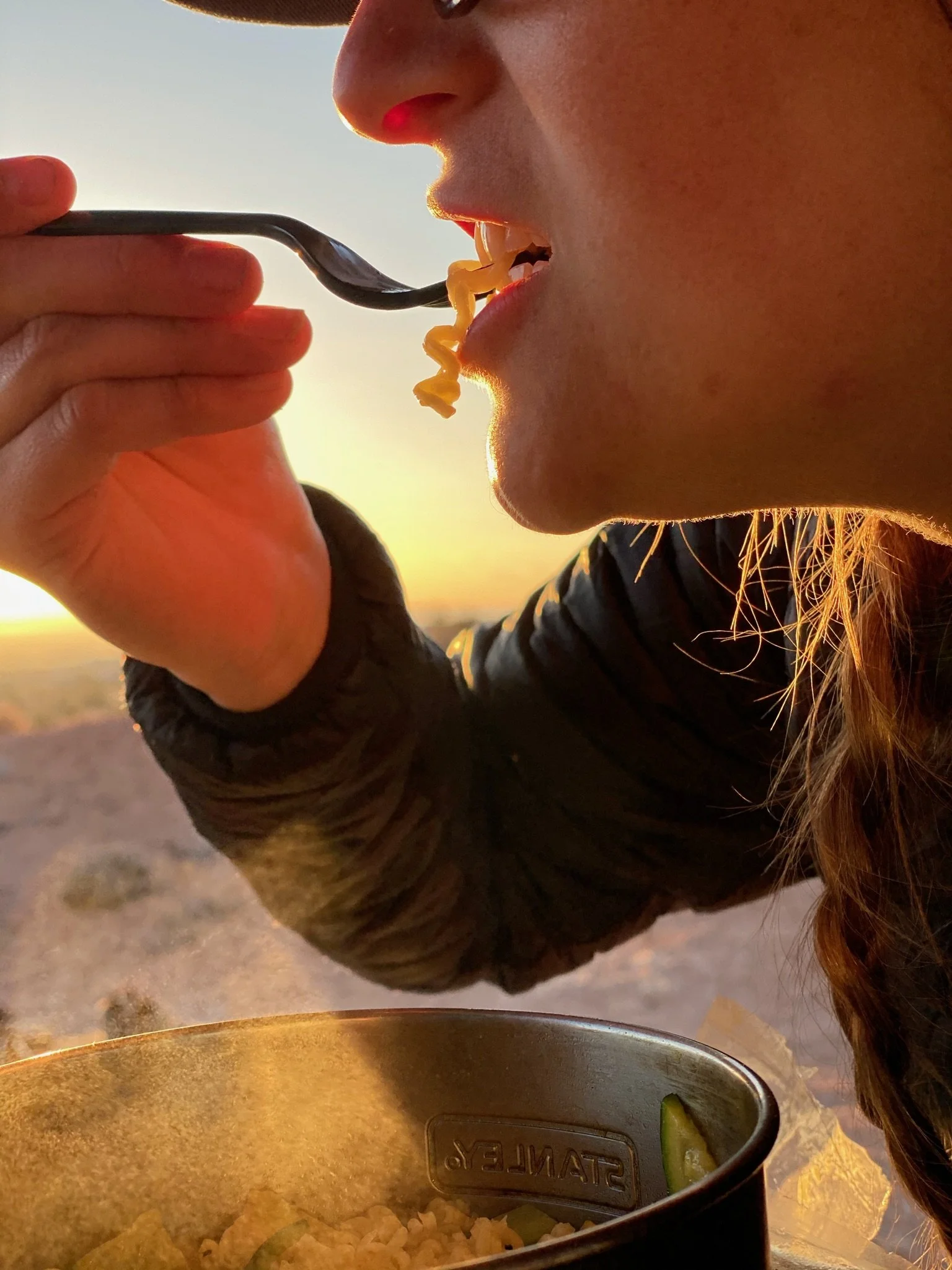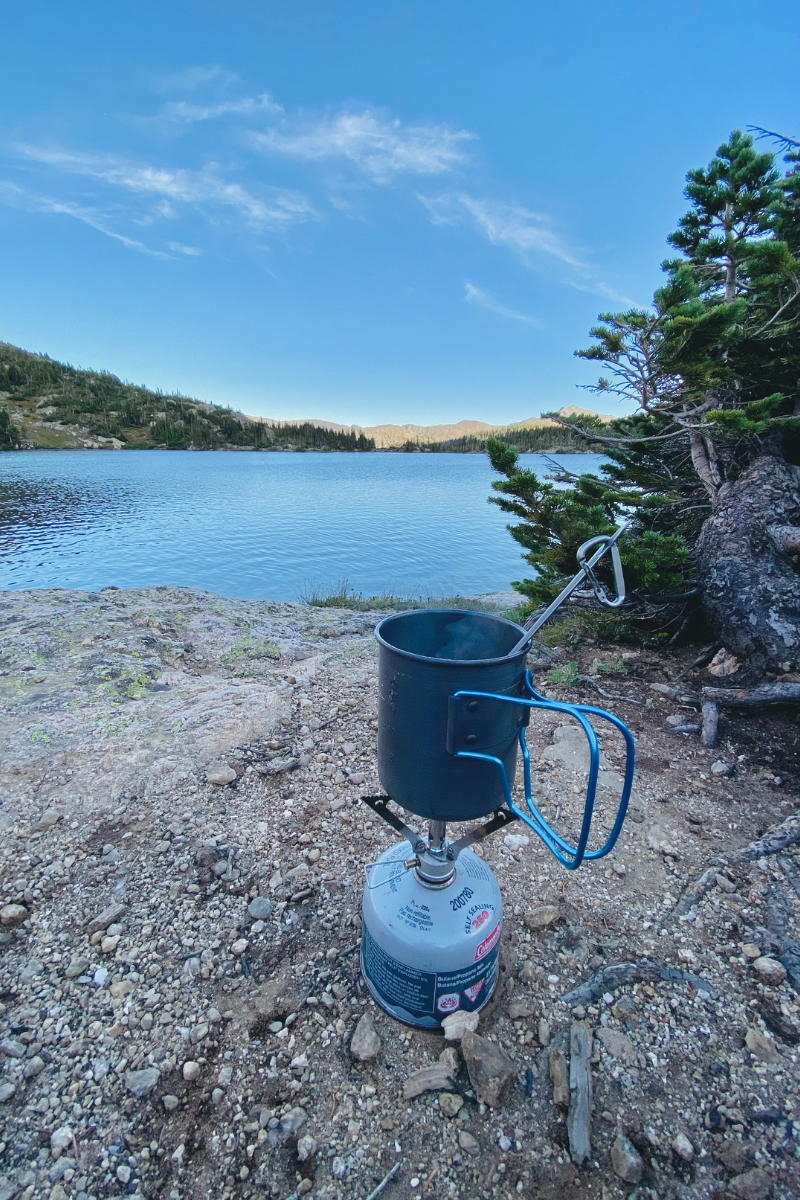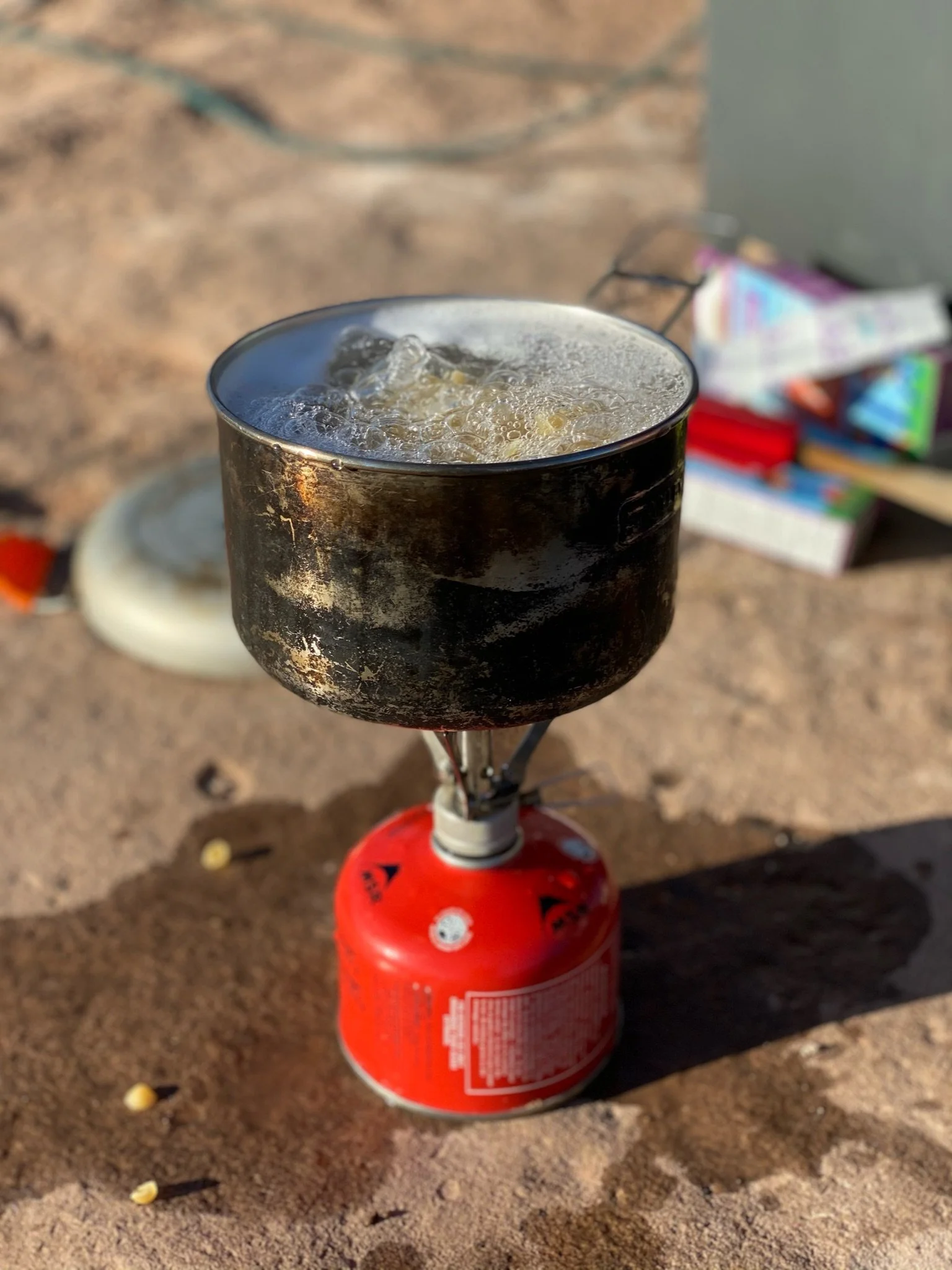Backcountry Cooking
Nutrition in the backcountry is really important because you are pushing your body to perform for you in strenuous ways. You will be burning lots of calories therefore you need lots of calories to refuel. A lot of people don't pack enough food because they are thinking about their normal appetites or trying to save on weight however, having a solid meal plan will make your backpacking trip so much more enjoyable. Hiker hunger will make it hard for you to perform well physically and your mind will feel foggy. There is nothing more rewarding than eating a delicious camp meal with an epic view.
On my very first backpacking trip I brought canned soups with me... boy did I learn VERY QUICK how inefficient this was. Every pound adds up and this was a classic rookie mistake.
So on my trips after that I bought freeze dried backpacker meals. Boil some water, crack it open and let the water do its magic to create an edible meal. Some backpacker meals are actually really good but I find most to be just tolerable. Although this option is efficient, light weight and produces no mess- they're pretty expensive.
DIY backpacking meals are where it's at though! It requires some well thought out planning but will be save you money and ensure you are eating a very tasty meal. Over the last couple of years I've experimented with different meals and preparations so I can make dinner time in the backcountry a special experience that I look forward to at the end of a long day of hiking.
Considerations
What does your body need?
You will burn anywhere from 300-700 calories PER HOUR depending on factors like distance, pack weight and elevation gain. That means your calorie intake should be way higher than what you normally consume. I aim for around 3000-3500 calories a day which is a lot more than my normal day to day dietary intake.
Choosing nutrient dense foods that aren't perishable is key.
Nuts
Peanut Butter
Granola
Oatmeal
Jerky
Dehydrated Fruit
Vegetables
Protein Pasta
Packaged Tuna & Crackers
Instant Rice
Dark Chocolate
Beans
Hard Cheese
These are all great options because they are lightweight, easy to prepare and don't require refrigeration. I typically plan on making a breakfast and dinner, while for lunch I just snack often throughout the day.
What will the clean up situation be like?
Trust me, you want to think about this when planning meals. Sometimes your resources will be limited (as will your energy by dinner time) and there's nothing more annoying than having to find a pine cone to scrap off caked on bits of food from your cookware. I'M TALKING ABOUT YOU MAC AND CHEESE. But in all seriousness, the less mess you make the better. So if I am making something like a mac and cheese or a pasta, I will make sure the sauce is a little more watered down and less thick so it doesn't become a nightmare to clean.
Are my meals balanced?
The breakdown goes a little something like this: 45-55% carbs, 35-40% fats and 10-15% protein.
Carbs are critical for converting glucose into energy. Backpackers who don't intake enough carbs will eventually see their muscles turn into chicken legs because their body wasn't getting enough carbs and had to start digesting protein for energy. Don't skip the carbs or you will hit a wall and not be able to perform well. The goal is to find meals that have the most calories and nutrition for the least amount of weight possible.
How many steps are involved in this meal?
I'm a big fan of one pot meals and I do all my prep work at home before I even leave. Cutting vegetables, pre cooking pasta, repackaging beans, etc... Ideally prep your food ahead of time in heavy duty Ziploc style freezer bags and then you can use that bag for trash afterwards. Prep and season what you can ahead of time to minimize waste. This will also increase your efficiency out in the field.
Some meals deserve a multi-step process and I do acknowledge this. Quesadillas and making backcountry pizzas require a little more fuel and making each one separately but is SOOO worth it. Just think about the type of trip you are going on to make those calls ahead of time. Is this a quick trip with a lot of downtime or are you on a long expedition where weight, fuel reserves and time matters a lot ?
If I'm backpacking out to a spot that I plan to stay at for a couple of relaxing nights, you better believe I'm going all out and making pizzas! If I'm on a 6 night/7 day excursion, I'm going very lightweight and simple. You have options!
Some of My Favorite DIY Backpacking Meals
Burritos
Ingredients: instant rice, black beans, tortillas, peppers, onions, seasoning blend, cheese block and olive oil.
Prep: Pre-cut peppers and onions at home- the smaller the better so it will cook faster and you can preserve your fuel. Repackage black beans into Ziploc and throw your peppers/onions/seasoning in there as well.
At Camp: Sauté your seasoned peppers and onions with some olive oil. Add the black beans and rice when those are becoming soft. Allow that to heat up for a few minutes and then shut your stove off. Scoop into tortilla and cut off some hard cheddar to add before rolling up and enjoying.
*Make sure you bring a HARD cheese. No soft cheese and avoid if you are going somewhere like the desert mid-summer. Otherwise WOW cheese in the backcountry is a game changer y'all !
Veggie Pesto Pasta
Ingredients: Chickpea pasta, onions, peppers, mushrooms and pesto.
Prep: Pre-make your pasta so it's a little less than al dente. Cut your veggies and then place it all in a Ziploc bag adding the pesto as well. Add pasta to it's own Ziploc bag.
At Camp: Sautee your veggies and pesto. Add pasta in when veggies get soft. Throw in a splash of water to help the pasta cook up and then enjoy!
*I don't need olive oil for this one because the pesto base is oily enough. I will typically just splash a little water in as needed and keep my heat lowered.
This one is SOOOO dang delicious and the chickpea pasta helps you get those healthy complex carbs and protein. So much better than a regular pasta!
Jambalaya
Ingredients: Instant rice, summer sausage, freeze dried veggies, tomato powder, cajun seasoning, beef bouillon cube and olive oil.
Prep: Place the rice, veggies, tomato powder, cajun seasoning, olive oil and beef bouillon cube in a Ziploc freezer bag. Package sausage separately.
At Camp: Combine everything that is in the Ziploc bag in a pot and cover with water allowing it to simmer for 10 minutes. Cut up that summer sausage and throw it in for the last couple minutes so it gets hot and then voila, enjoy!
I love this one because you can adjust the ingredients to make it spicy or omit the sausage and add beans for vegetarians. A really delicious dinner with such an easy cleanup!
Next Level Backcountry Cooking
Get a dehydrator and eat like royalty however long or hard the adventure is! Admittedly, I'm not at this level yet but I've meal prepped with a friend of mine who owned one and wow... just wow.
Yes, the prepping process becomes MUCH longer but it seriously pays off! You will essentially be making gourmet meals ahead of time, dehydrating each ingredient, and then combining them in a Ziploc freezer bag to rehydrate in the field. You literally will just boil water, pour it in the bag and eat it straight from there.
NO MESS.
NO CLEAN UP.
AND IT TASTES BOMB !!
Doing this yourself tastes SOOOO much better than the store bought backpacker meals. Plus you'll save a ton of money! You can also prep in bulk and store them for use all season. If you're planning a thru-hike, I see no other option than to get to this level. Buying a dehydrator is a worthy investment!
This is the Elite Gourmet Food Dehydrator you can find on Amazon! It comes with a 1 year warranty and 5 BPA free trays that are dishwasher safe. I just snagged one of these and I can't wait to start experimenting with different recipes for backpacking.
I hope this helps you feel more comfortable with the idea of backcountry cooking! Planning and preparing for your next adventure can sometimes be overwhelming but taking the time to arrange a well thought out meal plan is so worth it. It should be a fun and creative experience. The future you who is backpacking and starving will thank you endlessly! Please comment and subscribe to our community to be notified of future posts like this!
Happy Trails xo Dee






